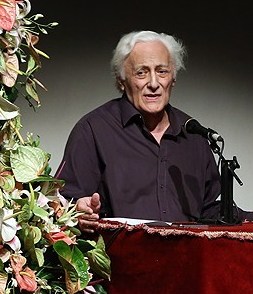
Manuchehr Anvar is a Persian writer, editor, translator, director and former BBC radio presenter.
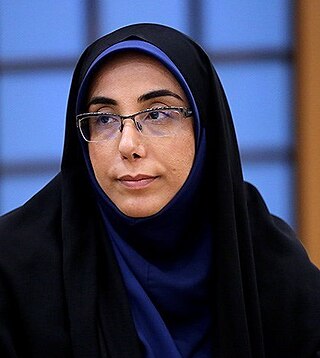
Sakineh Almasi is an Iranian politician who was a member of the Parliament of Iran, representing Kangan, Jam, Dayyer and Asaluyeh district. She is also Vice President of Federation of War Veterans and Disabled Persons of Iran.

Elham Fakhari is a psychologist, Politician, writer, painter, poet, member of the Central Council of the National Trust Party, and a former member of the City Council of Tehran, Ray, and Tajrish.
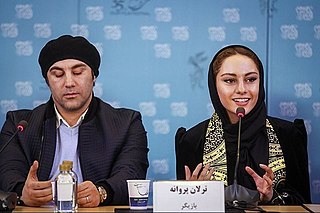
Tarlan Parvaneh is an Iranian actress. She has received various accolades, including nominations for a Hafez Award and an Urban International Film Festival Award. She won a Children and Youth International Film Festival Award for her performance in Octopus 1: White Forehead (2011).
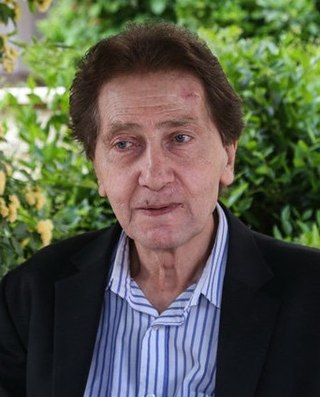
Saeed Mozaffari is an Iranian dubbing director and voice actor. Most of his dubbing is with Brad Pitt and Jackie Chan. Saeed Mozaffari started working in the field of dubbing around 1962.
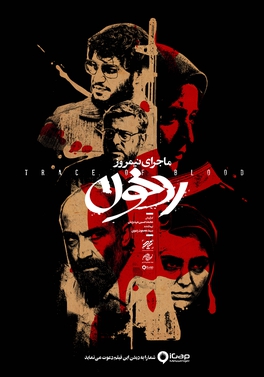
Midday Adventures: Trace of Blood is a 2019 Iranian war drama film directed by Mohammad Hossein Mahdavian and written by Ebrahim Amini and Hoseein Torab Nejad. The film is a direct sequel to the 2017 film Midday Adventures.
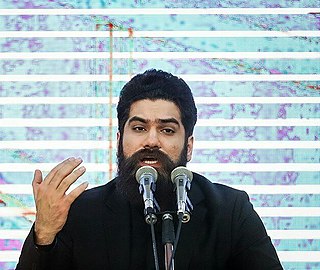
Ali Zand Vakili is an Iranian singer, composer, and music teacher. He began his artistic career in music as a child by singing and playing the tonbak. In 1998, after the establishment of Shiraz Music Conservatory, he was one of its first entrants. After studying at Shiraz Music Conservatory for three years and learning santour, piano and tonbak in 2002, he entered Tehran Conservatory of Music and graduated from there. He went on to read the piece and a few years later became famous with the release of the lullaby piece. Zandukili is currently a music expert.
Kelid was a non-partisan Persian language newspaper established in 2013. It was banned in November 2021 by government council for monitoring publication. According to foreign and domestic press it was banned for hinting criticizing the Supreme leader for millions of Iranians being under poverty line using a photo of bloody hand of Ali Khamenei in frontpage. owners were charged.

Shahab Moradi, is an Iranian clergyman, preacher, and university lecturer. He has appeared in different programs on Islamic Republic of Iran Broadcasting as an expert since 2000.

Hooman Haji Abdollahi is an Iranian actor, television presenter, voice actor born on 14 July 1975.
Mohammad Mansouri Davar is an Iranian Jiujitsu and MMA athlete. He is captain of the Iran Jujitsu national team. He won the silver medal at the 2014 Asian Beach Games in Phuket, Thailand and the gold medal at the 2017 Ju-Jitsu Asian Championships in Hanoi, Vietnam. He won first place at the 2009 Ju-jitsu Asian Indoor Games in Hanoi, Vietnam.He is a Member of the Iran Jiujitsu National Team in the 2018 Asian Games and 2017 Asian Indoor and Martial Arts Games in Ashgabat Turkmenistan.

Mohammad Saleh Meftah is an Iranian jurist, political activist and journalist. He is a member of the Central Council and chairman of Progress and Justice Population of Islamic Iran. He is known as an activist of the Persian-language Twitter community and as someone who makes demands of the authorities. He was born in Estahban, Fars province, and lives in Tehran. He is known as a Principlist political figure and media activist, and he is a member of the Central Council of the Muslim Bloggers Association.
Sina Alam is a musician, composer, and a player of the kamancheh, ghichak, and violin, the lattermost of which he began his career in music. As a teenager, he attended high school at a music conservatory playing the kamancheh as his main instrument. He continued his career under the supervision of various professors.
Mehdi Safaei is an Iranian athlete, investor, lecturer and entrepreneur. He is owner of Concept Industrial Group and the national sample entrepreneur.
Peiman Biabani is an Iranian wrestler. He competed in the 2019 Asian Wrestling Championships at Xi'an, China, where he won the bronze medal in his event.
Seyed Moein Taghavi, also known as Moein Taghavi, is an Iranian wushu athlete. Taghavi has a record of winning domestic competitions, Asian championships and world championships. He also won a gold medal in the Wushu World Cup and won the championship title, but due to the positive announcement of his doping test, the medal won was lost for Taghavi.
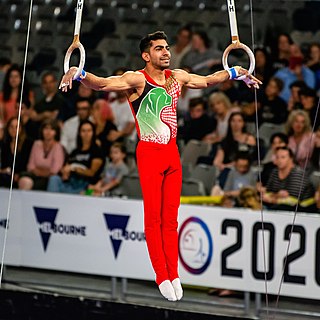
Mehdi Ahmadkohani is an Iranian artistic gymnast.
Alireza Yavari Foroushani is an Iranian swimmer whose specialty is butterfly and freestyle races. He competed in the men's 100 metre butterfly and men's 200 metre butterfly events at the Swimming at the 2018 Asian Games and at the 2019 World Aquatics Championships.

Ahmad Reza Eidi(Persian: احمد رضا عیدی, born 6 December 1989 in Lorestan) is an Iranian jiujitsu and judo athlete. He won the silver medal at the Ju-jitsu at the 2014 Asian Beach Games in Thailand and the gold medal at the 2017 Ju-Jitsu Asian Championships in Hanoi, Vietnam.He won the silver Medal at the 2015 Ju-Jitsu west Asian Championships in Lebanon. He is Member of Iran jiujitsu National Team in 2018 Asian Games In Jakarta and 2016 Asian Beach Games In Danang, Vietnam and 2014 Ju-Jitsu World Championships.












